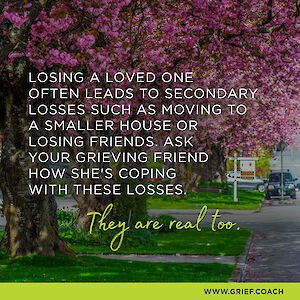How I learned to help the grieving one text message at a time
It was 10 years after my husband died before I discovered that it was people's discomfort with death and grief - not their feelings about me - that kept them away.
I started building Grief Coach so that no-one else would have to wait that long.
The Grief Gap
Barry’s suicide left me more debilitated and disoriented than I ever imagined possible. I struggled to tie my shoes, use the ATM, or make a simple phone call. I was incredibly lucky to have girlfriends who sat up with me night after night, a sister who moved across the country to live with me, and a wonderful grief therapist who specialized in working with suicide survivors.
But there were also people I didn’t hear from — friends and relatives I thought would be in my life forever. As time passed in silence, I began to make up stories in my head about why they had disappeared; perhaps they blamed me for Barry’s death?
It wasn’t until a decade later that I found out the truth.
Reconnecting
Twelve years after Barry died, his best friend (and second cousin) was diagnosed with terminal cancer. Where others had stayed quiet, this friend stood by me when Barry died. He called me on painful anniversary dates, and asked me to be godmother to his first child, which meant an enormous amount. I was devastated by his diagnosis, but grateful to be able to spend his final months with him, and to have the chance to express my deep gratitude.

Before he died my friend asked me to speak at his funeral. I immediately accepted, and only later realized what I had signed up for: his friends and family had been our friends and family. And I would have to face them at his funeral after over a decade of silence. I was terrified.
As I took my seat at the funeral, the woman next to me in my pew immediately asked how I knew the family. When I told her my name, her face collapsed. “Are you Barry’s widow?” she asked. She was visibly shaken. “I’m so sorry I didn’t reach out back then, Emma, I’ve been wondering about you all this time. How are you? Did you remarry? I don’t know why we didn’t call you,” she explained. She was ashamed and apologetic. Over the next two days, I had dozens of similar conversations and heard an outpouring of regret and embarrassment. I like to think this was a final gift from my friend, who had always wanted me to know that people did care about me, and that no-one thought Barry’s suicide was my fault. Instead I learned that people cared about me very much, and that it was their fear and uncertainty that led them to stay away.
The Birth of Grief Coach
On my flight home from the funeral, I reflected on what had been an emotional, but also eye-opening, weekend. I thought about the fear and discomfort that had kept people from reaching out. I thought about the pain that their distance had caused me — but also the pain that their distance had caused them. For over a decade, people I cared very much about had been carrying around guilt and shame.
It all seemed so unnecessary. I knew we could do better.
So I started brainstorming about how I could help. At that point in my career I’d spent over 20 years developing online and mobile communities to drive change. I’d created mobile platforms to engage young voters, as well as one of North America’s first online crisis intervention chat lines. I’d seen technology be effective in those areas, and was sure it could also help people to support their grieving friends and family.
Accessible, Affordable Support
When I got back to Seattle, I began designing Grief Coach. My goal was to give people practical tips and reminders, as well as confidence and support, so that they could more easily help their grieving loved ones. My experience building technology solutions, as well as my experience as both a griever and a supporter, had taught me that I had to build something that was:
- Accessible. I knew I needed to build a solution that would be accessible and simple to use, because the last thing we need when we’re grieving is complexity. I liked the idea of short, time-based tips and reminders that are easy to digest. I couldn’t read a paragraph — never mind a whole book — when I was grieving, but I could have managed short text messages. This is why I chose to build a text messaging platform instead of an app. There’s nothing to install. Texts come right to your phone at least once a week, as well as on key dates that matter to you.
- For Friends & Family, Too. There are plenty of books, websites and resources out there for people who are grieving, but when someone dies, all of that information can feel overwhelming. What the grieving person really needs, is the support and understanding of the people around them. I agree wholeheartedly with UK bereavement therapist and Grief Works author Julia Samuel, who says “I asked many people who were bereaved what the single most important factor in the rebuilding of their lives was, and every single one of them said ‘My partner .. my parent .. my friend .. my sibling.’ It may be one close relationship or it may be many friends and family playing different roles. But the path to rebuilding your trust in life has to be paved with people who care about you.” I believe the only way to make sure no one grieves alone is to give friends and family the tools they need to support each other through loss.
- Affordable. I received free, one-on-one grief counseling in Canada that was incredibly valuable, but not everyone is so lucky. Therapy is simply too expensive for many grievers, especially at a time when extra expenses are already piling up. I focused on creating a lean, nimble platform so I could make Grief Coach affordable for as many people as possible.
- Scalable and Global: Traditional approaches to grief support simply aren’t scalable in the way we need them to be, and are often geographically based as well. This leads to a lot of unmet demand, as organizations and families struggle to reach everyone who needs them. By making Grief Coach scalable and global, I hope to support hundreds of thousands of people who might not otherwise get the help they need.
With these four guiding principles in mind, I spent my evenings and weekends for the next year and a half creating Grief Coach: a text messaging platform that delivers personalized tips and reminders to people who are grieving, as well as to the friends and family who want to support them.
Our messages are customized based on things like cause of death and relationship to the deceased. They go out at least once a week, with extra messages to remind people about birthdays and death anniversaries, as well as messages that provide extra support and suggestions on holidays such as Mother’s Day.
Early Feedback From Our Subscribers
Grief Coach went live in March of this year, and in just four months we’ve seen subscriptions coming in from across the US and around the world. It’s been an amazing and humbling feeling, to be working with bereavement experts, grief organizations, and of course individuals and their supporters, each and every day. For the first time I know that something valuable has come out of my personal losses. One subscriber, Candice, shared this …
“When I’m reading Grief Coach text messages, I feel as if someone I trust — someone who has gone through this themselves — is speaking directly to me. The messages are personal and thoughtful; they help me to process my grief and keep my Dad in my heart.”
Reading feedback like this is a gift, because of course it’s why I created Grief Coach in the first place. And we’re just getting started. We have big plans, including finalizing our new Teen Series and kicking off the Hospice program we’ve created to help Bereavement Managers deliver scalable support to the families in their care.
For now though, my favorite part of the day is going through the next day’s message queue. Every day, as I read the text messages that are scheduled to go out to our courageous grievers, and the friends and family who support them, I am reminded that people are good, and that we want to be there for each other when things are turned upside down. We just need a little help sometimes.